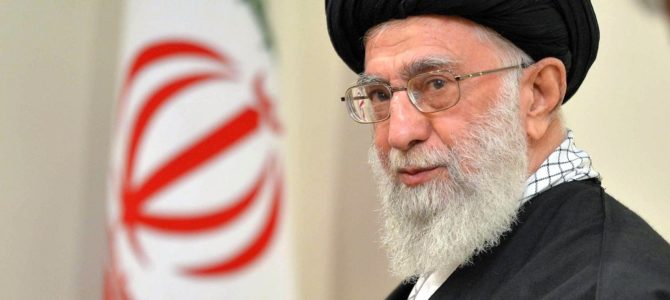
While America is often insulated from the most malign of Iran’s activities, even if only by dint of our distant geographic position, the brazen and bellicose mullocracy has reminded us of its global reach at a pivotal time. This global reach extends from our Transatlantic allies, to our southern neighbors and our own shores. Clearly, Iran feels it perfectly acceptable to carry out murderous acts here in the West with impunity.
This all should only underscore the need to counter the Khomeinist regime using every element of national power at all points of leverage. The political establishment’s silence in the face of this threat — if not its urging to engage further economically with Iran while punishing its foes in spite of the calamitous consequences of that very policy during the Obama years — is stunning.
For the latest evidence of Iran’s audacious aggression, America need look no further than Europe. There, Iranian hit squads, in part under diplomatic cover, have been exposed for plotting a string of assassinations in what seems to be a concerted campaign to take out the ayatollahs’ political rivals in exile, among other foes.
The latest evidence of this effort comes mere days before U.S. sanctions are set to “snapback” on Iran in strategically significant sectors like shipping, energy and finance. Some Europeans have resisted these very sanctions. But do not hold your breath waiting for the media and political establishment to harp on these attempted hits. This is Iran after all, not Saudi Arabia.
According to the Associated Press, in September 2018, Denmark’s national security service foiled an alleged assassination plot directed by Iranian intelligence against a leader of the Danish wing of a militant Iranian separatist group called the Arab Struggle Movement for the Liberation of Ahwaz (ASMLA). This follows the 2017 murder of the founder of the ASMLA, Ahmad Mola Nissi, in The Hague at the hands of an “unidentified assailant.” Dutch authorities reportedly expelled two Iranian diplomats who may have been linked to the Nissi assassination.
ASMLA consists of Ahwazi Arabs, a small minority in Persian-dominated Iran, who desire independence, and according to Amnesty International are subject to severe repression. ASMLA has engaged in violent acts against the Iranian regime, including attacks on energy infrastructure in Iran’s oil-rich Khuzestan province, where Ahwazis predominate, and against the Islamic Revolutionary Guard Corps (IRGC).
ASMLA was implicated — at least by the Iranians — in an armed ambush of a military parade just days before the Danish assassination plot was foiled, killing more than 20 people. Their alleged connection to that attack is unclear. Iran has since further cracked down on the Awhazi population. In the wake of the alleged ASMLA ambush, the Islamic Republic also recalled the envoys of Denmark, Great Britain, and the Netherlands for supposedly harboring ASMLA, which it lists as a terrorist group.
It appears Western governments disagree with this designation. Danish authorities had reportedly been protecting the ASMLA leader targeted by the Iranians for months because of threats to his safety. Israel’s Mossad supposedly provided critical intelligence that enabled Denmark to scuttle the attack. Denmark’s Prime Minister Lars Løkke Rasmussen tweeted after the plot was revealed: “It is totally unacceptable that Iran or any other foreign state plans assassinations on Danish soil. Further actions against Iran will be discussed in the EU.”
It is clear the Danes did not consider this some kind of justifiable Iranian counterterror operation. Meanwhile, ASMLA’s branch in the Netherlands appears to operate openly. The United States does not designate ASMLA as a foreign terrorist organization. It is telling that Iran has denied the plot allegations as “biased” and “anti-Iran,” while threatening Denmark over taking “ill-advised and controversial actions,” rather than even trying to level a propagandistic argument that it was pursuing a terrorist organization abroad, as Western nations do.
Meanwhile, this past summer, Iranian intelligence allegedly plotted an attack on an event outside Paris attended by thousands, including notable American political figures such as Newt Gingrich and Rudy Giuliani. The rally was organized by The National Council of Resistance of Iran, and backed by the Iran-hated Mujahedin-e-Khalq (MEK) opposition group. The foiled plot resulted in four arrests, including that of an Iranian diplomat stationed in Austria.
MEK, which is dedicated to overthrowing Iran’s mullocratic regime and establishing a “secular republic,” used to be designated as a terrorist group by many Western governments. Those designations were lifted in the EU, United States, and Canada between 2009 and 2012. In March, Albanian authorities arrested two Iranian nationals on terrorism charges — purportedly threatening MEK — after they were caught allegedly carrying out reconnaissance on a location prior to the Iranian Nowruz New Year celebration.
Iran’s unwillingness to take responsibility for these operations betrays its full knowledge that it is acting illegitimately, not just fighting militants, living up to its name as the world’s leading state sponsor of terror. Iran’s assassinations abroad of course extend well beyond just seeking to pick off threats to the dictatorship’s power. In January, German police conducted raids across the nation in pursuit of 10 alleged IRGC Qods Force intelligence officials spying on Israeli and Jewish targets.
Back in 2012, Hezbollah operatives allegedly blew up a bus at the Burgas airport, killing 5 Israelis and the Bulgarian bus driver and injuring 32 more Israelis. Highly curiously, in spite of Bulgarian authorities’ original attribution of the attack to Hezbollah, and of substantial evidence supporting that claim, the prosecutor of that case has now excluded Hezbollah from the indictment, perhaps indicating fear of further Iranian bloodshed. Such Iran-linked plots in Europe stretch back 40 years.
Perhaps most brazenly of all attempted Iranian attacks on political opponents in the West in recent memory is the alleged Quds Force-backed plot to bomb the then-Saudi ambassador to the United States, Adel al-Jubeir, at Georgetown eatery Café Milano in 2011. There is also disastrous competition for Iranian carnage in our hemisphere, when one considers the 1994 AMIA bombing. Needless to say, behind the bespectacled, Cheshire cat-like, seemingly urbane Iranian officials who face the West, lies a regime that has no qualms about murdering its perceived rivals abroad.
At home, the Khomeinist mullocracy is responsible for pervasive human rights abuses and violently suppressing political dissent (even taking Washington Post journalists hostage), and holds the dubious distinction of ranking number one in the world in per capita executions. It seeks to expand its Islamic Revolution and subdue rival regimes not only by threats, proxy wars and jihad, but also by cyberattacks and information warfare.
“Death to Israel,” followed closely by “Death to America,” form the unifying ethos of Iran’s Islamic totalitarian theocracy. Stated succinctly, Iran combines the brutal savagery and repression of the Saudis, with the subversion and destabilization emphasis of the Russians and the Jew-hatred of the neo-Nazis – with its hands drenched in the blood of hundreds of Americans dating back over the almost 40 years since the overthrow of the Shah and the taking of U.S. hostages at our embassy in Tehran.
Yet in the wake of l’affaire Khashoggi, Russiagate and the neo-Nazi attack on a Pittsburgh synagogue, there is no such widespread call for challenging Iran. On the contrary, the badgering by the likes of former Obama national security advisor Susan Rice, representative of our progressive media and political establishment, to push Saudi Arabia’s Muhammad bin Salman (MBS) aside as our number one priority in the Middle East would lead to the very chaos that would benefit none other than the Saudi’s sworn enemy, Iran.
Of course, making Iran the Middle East hegemon while empowering the “political Islamist” Muslim Brotherhood was always the desire of the Obamaites, many in the foreign policy establishment, and certainly their like-minded lackeys in the media. Perhaps more baffling is that Jason Rezaian, the Iranian-American former Tehran bureau chief of the Washington Post, who was arrested and held prisoner for a year-and-a-half by the Khomeinist mullocracy, yet argues, “Instead of isolating Iran and its people any further, I say embrace them.”
This coddling of Iran and chiding of its foes is inexplicable from the perspective of American national interest, given only Iran poses an imminent, direct threat to America and her allies, not just on the streets of Berlin or Paris, but in Latin America and on U.S. soil. In fact, as we fast approach the re-imposition of sanctions on the Iranian regime, there are indications that the Khomeinists will directly threaten if not outright attack America and her assets.
Those who continue to adhere to the Iran appeasement agenda while attacking its foes and giving other equally brutal and detrimental regimes a free pass should be asked the following questions regarding Tehran:
- If you believe in the imperative to punish dictators who threaten human rights, why do you steadfastly oppose exerting maximum economic pressure to hamstring such a regime?
- If you believe in preserving Western civilization, why are you willing to sell it out to a mullocracy that threatens to murder citizens on your own soil?
- If you believe in the necessity to fight anti-Semitism, why would you appease and enable supremacist fanatics dedicated to destruction of the Jewish state?
Our Wilsonian internationalist national security and foreign policy establishment owes us an explanation for why, given the history of tyranny, bloodshed, and anti-Americanism, its faithful are so devoted to making their bed with Khomeinists on the Shia side and Muslim Brotherhood members and Islamist fellow travelers on the Sunni side. Either the establishment should treat all such regressive powers with equal contempt and aggressiveness, or it should admit it plays favorites, and tell us why its favorites happen to be the most hostile of all towards America.
More pressingly, the foregoing underscores the danger posed by an Iran evidently willing to engage in assassinations around the world, an Iran likely to grow increasingly desperate and thus dangerous as sanctions starve it for cash. The answer to Iran’s aggression is not to appease it — which only rewards aggression — but to meet it with overwhelming strength and an indomitable will.









